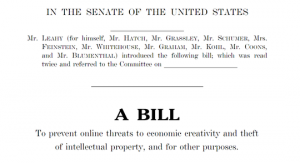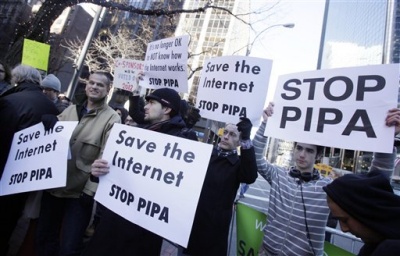Protect IP Act
Contents
Overview
The Protect IP Act is a bill of legislation passed by the United States Senate that grants the US attorney general greater accessibility to regulate web sites featuring pirated content and counterfeit goods. [3] By restricting access to websites with counterfeit products or illegal content, the government hopes to promote integrity and ethical business practices by websites on the internet. This bill also allows the United States Department of Justice greater legal access to consider the ramifications of such illicit activities and punish websites participating in them. The legislation was meant to protect content creators, but ultimately, posed more conflicts than benefits. [4]
Support
In Congress
As of Tuesday December 11th, 2012 the Protect IP Act has support in the Senate from 31 Senators, on both sides of the aisle. In total, 10 Senators have withdrawn their support of this bill in 2012. Here is a complete list. [5]
Companies and Businesses
The Protect IP Act is largely supported by companies and businesses involved with copyrighted and trademarked products. Main supporters include the Recording Industry Association of America(RIAA), the Motion Picture Association of America(MPAA), the Screen Actors Guild, and the National Cable & Telecommunications Association, the National Football League, and Nike, Inc. among many others.[6]
Opposition
In Congress
Many Senators have voiced concerns over the Protect IP Act, Especially Senator Ron Wyden(D-Oregon) who referenced issues that could possibly come up over basic rights like freedom of speech, innovation and Internet Integrity. [7]
Companies and Businesses
Companies and organizations that are opposed to the Protect IP Act are mainly Internet entrepreneurs. Websites like Facebook, Yahoo!, eBay, reddit, Google and Wikipedia all oppose the legislation. Other corporations like Mozilla, American Express, and the Electronic Frontier Foundation oppose the bill too. LinkedIn's Reid Hoffman, Twitter co-founder Evan Williams, and Dennis Crowley from Foursquare signed a letter sent to Congress detailing their displeasure with the legislation, and urging them to abandon it. [8] Other letters, signed by many other technology upstarts, were sent to Congress concerned that the law would decidedly affect economic growth and expansion in it's current form. They claimed that the Protect IP Act would "chill innovation in legitimate services".[9] On January 18th, 2012 several websites, including Wikipedia, reddit, and CNet, staged an Internet blackout in protest of the bill. Some websites totally blocked access to their websites in protest. [10]
Controversy and Issues with the Protect IP Act
Filibuster Plan
While Internet Rights groups rally against the Protect IP Act, the Act also faces opposition from within the Senate. Senator Ron Wyden, an Oregon Democrat, has discussed a plan for a filibuster when the bill comes up in the Senate, likely in early December, 2011[11]. Senator Wyden is working with a iberal activist group called Demand Progress to gather signatures in opposition to the bill[11]. Wyden plans to read each for the names of those who signed during the filibuster, with over 50,000 names in the first 24 hours coming in after Wyden's request[11]. As of December 8 2011, over 985,000 signatures have been collected on the internet site Avaaz [12].
Difference between SOPA and PIPA
SOPA and PIPA are, essentially, two versions of the same anti-piracy bill. Both are intended to curb online piracy but with different provisions and specific wording in the bill.
To differentiate from SOPA, PIPA does not have a provision that requires search engines to remove “foreign infringing sites” from their indexes. But it does require more court intervention to take down a site. The only downside is that it penalizes a copyright holder for making a false claim of infringement. In other words, a content creator can be proved wrong regarding an infringing site and the site can do nothing about its costs incurred in the litigation process.[13] The key difference is that PIPA does not threaten a large number of legal and innovative online services, including Twitter, Facebook, and YouTube. PIPA also has a greater chance of passing because it has not been in the spotlight and has progressed farther. PIPA has already passed out of committee and is primed for consideration by the full Senate, making it much farther along in the legislative process than the House’s SOPA.[14]
See Also
References
- ↑ Portion of SOPA Bill http://leahy.senate.gov/imo/media/doc/BillText-PROTECTIPAct.pdf
- ↑ CNET. "PIPA changes"http://news.cnet.com/8301-13578_3-20093304-38/five-essential-changes-to-protect-ip-act/
- ↑ McDermott, E. "Managing Intellectual Property." London: 1 May 2011. Web. 30 November 2011.
- ↑ 4.0 4.1 4.2 Ballard, M. "The Protect IP Act: A Powerful Tool, A Powerful Controversy." Mondaq Business Briefing. 22 June 2011. Web. 30 November 2011.
- ↑ List of Co-Sponsors http://thomas.gov/cgi-bin/bdquery/z?d112:SN00968:@@@P
- ↑ Letter supplied with a list of company supporters http://image.exct.net/lib/fee913797d6303/m/1/110525_MultiIndustry_S968_PROTECTIPAct_Senate.pdf
- ↑ Ron Wyden official site - places hold on IP Act http://www.wyden.senate.gov/news/press-releases/wyden-places-hold-on-protect-ip-act
- ↑ http://thehill.com/blogs/hillicon-valley/technology/180217-tech-entrepreneurs-oppose-online-copyright-bill
- ↑ http://opinion.latimes.com/files/entrepreneurs-worried-about-pipa.pdf
- ↑ http://news.cnet.com/8301-1023_3-57359763-93/wikipedia-to-join-web-blackout-protesting-sopa/
- ↑ 11.0 11.1 11.2 http://www.pcworld.com/businesscenter/article/244622/senator_threatens_filibuster_of_protect_ip_act_as_vote_nears.html
- ↑ Avaaz. "Save the Internet" http://www.avaaz.org/en/save_the_internet/ Save The Internet
- ↑ http://socialmediacollective.org/2012/01/17/whats-the-difference-between-sopa-and-pipa
- ↑ SocialMediaCollective. "SOPA/PIPA Difference"http://socialmediacollective.org/2012/01/17/whats-the-difference-between-sopa-and-pipa

